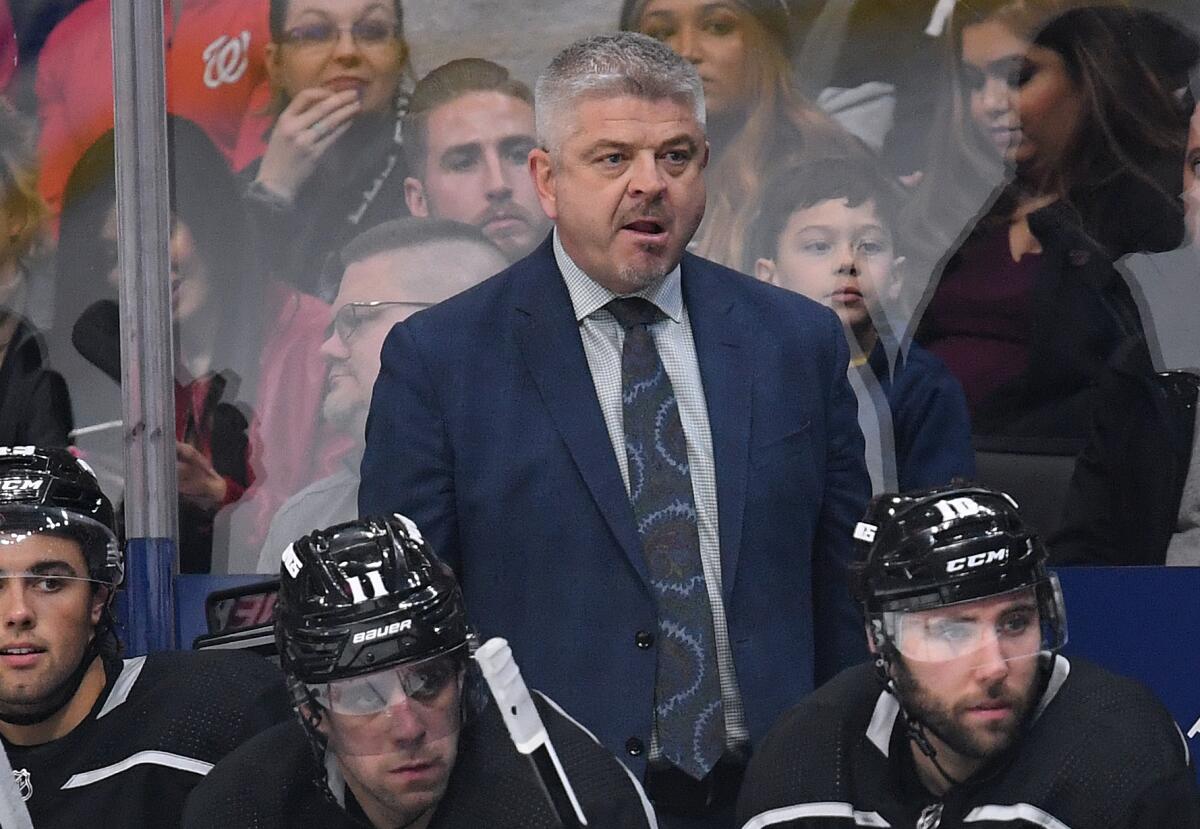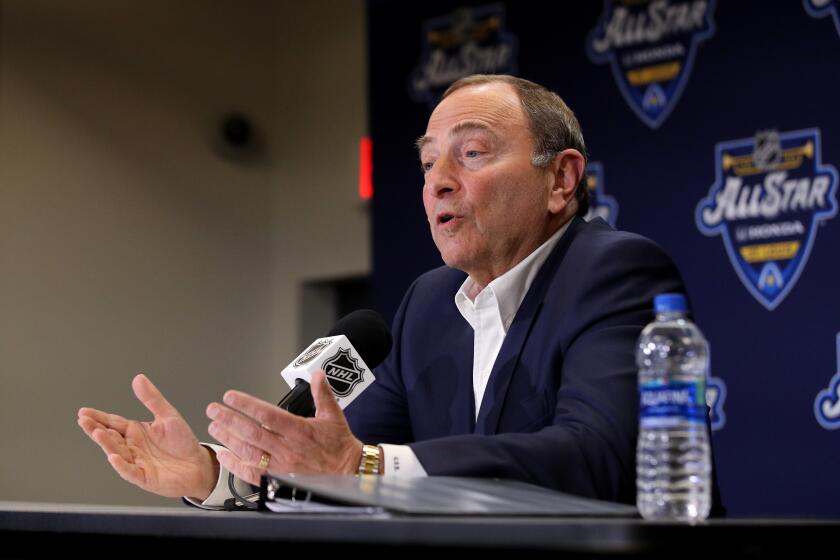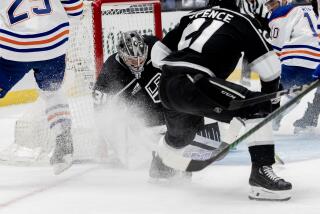Kings turn attention to next season as they wait to see if they’ll play again

On the computer in Kings coach Todd McLellan’s El Segundo office, there is a folder full of video clips. Of power plays and penalty kills. Breakouts and defensive breakdowns. Forechecks and backchecks. Good hockey and bad.
McLellan and his coaching staff have steadily built it over his first season with the Kings, saving sequences from almost all of their games that are shown during video sessions days, weeks, even months later. Each offers an example of the right or wrong way to play.
“We have it on video and we just store it and we can pull and put together different presentations to the players,” McLellan said. “Sometimes we can find the exact same situation, the same players, and [say], ‘Look, you worked into position here,’ or ‘You didn’t there.’ ”
McLellan described the collection as a digital library, but also as something much more lasting: “A foundation,” he said.
Because within it, his vision of the Kings’ future can be seen.
Following the NHL’s Thursday decision to pause the season because of the coronavirus pandemic, it’s unclear when that future will continue. With about three weeks’ worth of regular-season games left to be played, the league is hoping to resume the schedule at some point. A possibility remains that the rest of the regular season is scrapped.
With major sports leagues halting play over the coronavirus, small businesses that count on game-day traffic face difficult economic prospects.
But, even if the season is finished, McLellan has plenty of material from which to prepare for Year Two with the Kings. It’s all right there on his computer, and in recent weeks, his group gave him ample examples to carry forward.
When the season was suspended, the Kings had won seven straight games going back to last month’s trade deadline. With a reshaped roster (only 11 of the 19 players who took the ice in Wednesday’s 3-2 win over the Ottawa Senators were featured in the team’s season-opening lineup), they reinvigorated a campaign that seemed destined for a second straight last-place finish in the Western Conference, riding a scoring spike and shored-up goaltending to their longest winning streak in two years.
For the first time in a long time, the Kings looked like a winning team again. Though it might hurt their chances in the NHL draft lottery — they moved up to 28th in the 31-team league, and would have a 9.5% chance of getting the top pick and a 28.8% chance of a top three selection if the season was called off — it showcased a long-awaited move in the right direction.
“Look,” McLellan said Wednesday night, “you want to pick as high as you possibly can. It gives you the opportunity to pick the player that you want. More of them are available the higher you pick.
“But I think for us, the people that are in the trenches, what trumps that is the ability to evolve as an organization, as a team, as we rebuild and put some structure in place, put accountability in place, create a competitive group that hold each other accountable. And it’s starting to fall into place right now.”
Commissioner Gary Bettman, who suspended the NHL season this week because of the coronavirus pandemic, believes the league can finish the season in a sensible way.
Few saw this coming. In February, the team traded Kyle Clifford, Jack Campbell, Tyler Toffoli, Alec Martinez and Derek Forbort. It lost alternate captain Jeff Carter to injury (he last played on Feb. 18, more than a week before the win streak started) and had rookies at second-line center (Blake Lizotte), third-line center (Gabriel Vilardi) and in net (Cal Petersen, who has been splitting starts with Jonathan Quick).
They were supposed to spend the rest of the season crossing their fingers for the No. 1 pick, not crossing items off McLellan’s long-term to-do list. And yet, “we’re so much further along now than we were in Games 1-10,” McLellan said, specifically praising his team’s improvement running his higher-pressure, puck-moving system.
“We understood what we needed to do, we weren’t used to doing it then, we didn’t know how all the pieces would work together,” he said. “But now when we’re doing things well in the neutral zone, it leads to a good breakout, which leads to offense. The flow of the game is just beginning to happen now instead of them thinking about it.”
Captain Anze Kopitar sees it in their special teams, which were among the NHL’s worst for most of the season but have come around over the last month. During the winning streak, the team’s power play converted on 23.5% of chances while its penalty kill gave up only one goal in 17 opportunities.
McLellan, meanwhile, pointed to improved goaltending numbers, a byproduct of better play from Petersen and Quick but also better defensive structure from the skaters in front of them.
“We’re still making mistakes,” McLellan said, careful not to over-flatter a team that spent the season near the bottom of the standings. “We still have things to work on.”
Just fewer things than they once did. McLellan only needs to look as far as his computer to find the proof.
“We were able to fix things,” he said. “It’s the one thing that we’re doing quicker now than we were early in the year is repairing things, and the repair list is a little bit shorter than it was certainly at the beginning of the year. That’s a sign of progress.”
More to Read
Go beyond the scoreboard
Get the latest on L.A.'s teams in the daily Sports Report newsletter.
You may occasionally receive promotional content from the Los Angeles Times.








